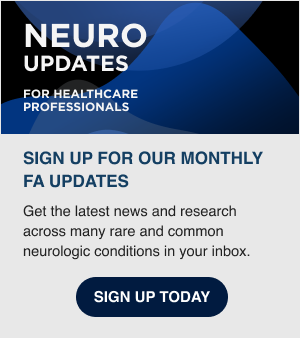Ensuring continuity of care for Friedreich's ataxia patients
George Wilmot, MD, PhD, shares his advice for how doctors can keep on top of the intricacies of multidisciplinary care for people with Friedreich’s ataxia.
About George Wilmot, MD, PhD
George Wilmot, MD, PhD, is a board-certified neurologist affiliated with a few hospitals, including Emory University Hospital. He also serves as an associate professor at Emory University School of Medicine’s Department of Neurology and adjunct associate professor at the the school’s Department of Pediatrics. He is an ataxia clinical researcher and he started the Cooperative Ataxia Registry.
Transcript
Continuity of care is an issue of our time, so to speak. It’s difficult to do when we’ve all become so subspecialized.
The most important thing is keeping lines of communication open very well and making sure to get the notes from the cardiologist or the primary care physician, not being afraid to pick up a phone and call another provider.
The best way to do it would be a very interdisciplinary clinic that has a lot of providers all involved, but that’s extremely hard to arrange, would be only at tertiary care centers, and even there, that’s hard to set up, so is usually not the way that it’s provided.
The other thing is that I think the family, the patient if they’re an adult, or family members and caregivers, need to be very proactive to make sure that what’s happening by one provider is taken into account from another provider.
Sometimes the neurologist kind of, with a disease like this, you know, is the point guard and directs things, but that varies a lot and it’s OK for that to vary. Different neurologists feel different comfort levels with, for instance, glucose screening — whether they should do that or primary care should do that.
Other things really need to go to specialists. For instance, if there’s significant scoliosis that needs monitoring and treatment decisions for that, obviously you’re going to need an appropriate specialist like an orthopedic surgeon, cardiologist for significant heart failure.
Some screening can perhaps be ordered by the neurologist and monitored, but that might be a little too much to ask for the neurologist and you want to make sure to get the best care.
So good communication is really the key.
Our FA medical advisor
 David Lynch, MD, PhD, is the director of the Friedreich’s Ataxia Program at Children’s Hospital of Philadelphia.
David Lynch, MD, PhD, is the director of the Friedreich’s Ataxia Program at Children’s Hospital of Philadelphia.

